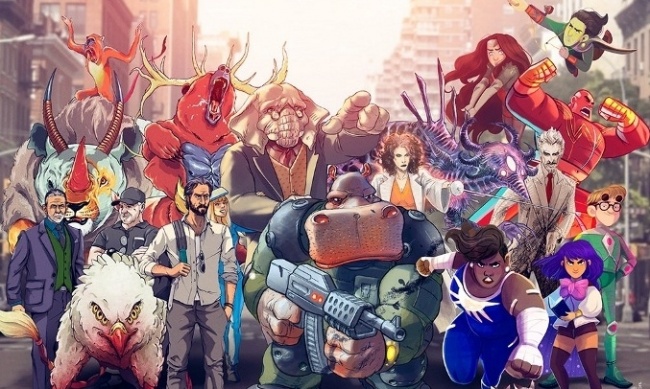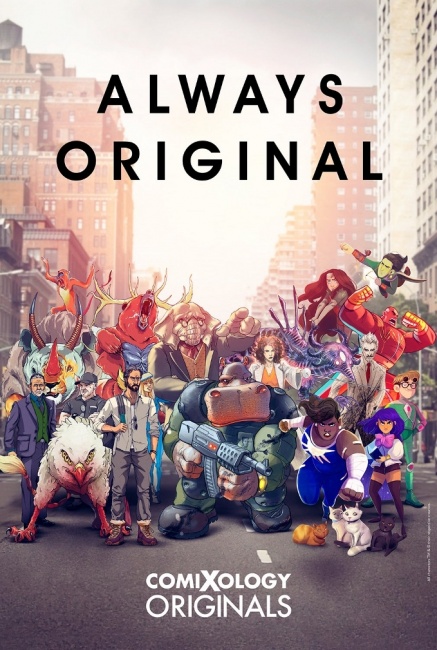Back in January, I listed one of my predictions for 2018 as "Amazon goes all-in on comiXology Digital Originals," writing "comiXology has been developing relationships with creators, book packagers and publishers… [which] by itself isn’t terribly disruptive. But if the company were to extend its ambitions into print, mobilizing the assets of its parent company Amazon to handle print-on-demand, targeted marketing and distribution outside the direct market system, that would be something to watch.” (see "Five Trends to Watch in the Comics Business").
Score one for the crystal ball. Late Friday afternoon, after much tease and hype, comiXology’s Chip Mosher appeared on Twitch – in black tie! -to unveil the new comiXology Originals program (see "ComiXology Announces New Originals"). While I covered the announcement for a general business audience over on FORBES, there’s more to the story in terms of its implications for the comics industry and fan culture.
Nuts and Bolts. In case you missed it, comiXology announced a new lineup of original content, including an original graphic novel, a couple of mini-series, and a continuation of the Elephantmen series, available digitally on all Amazon platforms. Content is free to read on the company’s all-you-can-eat sampling services comiXology Unlimited, Kindle Unlimited and Prime Reading, and available for purchase through either comiXology or the Kindle store.
For the first time, comiXology is also offering printed copies of the titles. These will be printed on demand at Amazon facilities and shipped direct to customers through the company’s fulfillment channels, usually in a couple of days.
The projects announced last week are only the first wave of a raft of new material from an interesting list of creators including Spike Trotman, Hope Nicholson, Jen Vaughn and others with proven appeal via their Kickstarters and independent work. Mosher, who recently moved over from his marketing and communications role to become head of content for the Originals program, said the company is seeking out diverse creators and unconventional work that might not sell well through the direct market, but has high potential to bring in new readers who don’t frequent comic book stores.
This is a familiar refrain to anyone who has followed comiXology, even prior to their acquisition by Amazon. Say what you want about the pros and cons of the digital distributor, but the company has been steadfast in pursuing this elusive new audience in all kinds of ways, from the digital self-publishing platform comiXology Submit to bringing Guided View comics to Amazon’s mass market Kindle platform to ongoing integration with Amazon’s vast customer data systems.
Crossing a line? With comiXology Originals, Amazon appears to be putting some actual money behind its plan. Creators retain ownership, get royalties and advances, and Amazon gets a first look at material in the program for development into other media content and games. Projects get distributed via digital and print, through a channel that completely bypasses the Direct Market.
Does this mean comiXology is becoming a publisher? Mosher strongly rejects that characterization, pointing out that the company has no editorial staff and relies on the creators to package and quality-control their own projects. A small group consisting of Mosher, comiXology CEO David Steinberger, and newly-promoted communications head Ivan Salazar (in consultation with a diverse group within cX), decides on the projects to greenlight, and has been known to send projects back for rework.
So… the company curates and acquires new projects, imposes standards and conditions for publication, shops the media rights on behalf of the creators, and manages both print and digital distribution. That’s a lot of quacking for something that denies being a duck.
The question is, does it matter, so long as the program continues to pursue projects opportunistically (rather than crafting a clear personality for the comiXology Originals brand), and seems content to backstop creators whose projects can’t get traction through other channels?
Invasion of the POD People. One of the more intriguing aspects of the announcement is the print-on-demand component. POD has a bad rep in the publishing world due to quality limitations. There are lots of reasons you wouldn’t want POD to become the default model for comics or art books, even if Amazon weren’t the ones pushing it. But let’s face it – there are some scenarios where it makes sense.
I got an early look at one of the POD books, the original graphic novel Savage Game. The color, sharpness, paper quality and binding are… good enough. As a delivery mechanism for mainstream stories, comics has certainly seen worse. The POD books are not high-end and not meant to be, but neither are many of the trade compilations of story arcs put out by the major publishers.
For the trade-off in quality, POD offers the convenience of not having to deal with niche titles going out of stock when the print run is exhausted, and not having to go immediately back to press if something causes a short-term spike in demand. It also opens the door to some intriguing possibilities, like letting readers create their own custom-printed collections from individual issues, or even individual pages and covers.
Some publishers aren’t interested in taking that deal no matter what, and that’s their call. For others, the flexibility might appeal in theory but they’re looking for someone else to be the crash test dummy on the business model. Either way, Steinberger frankly characterized the plan as an "experiment" and an "opportunity for us to take risks on behalf of publishers."
What me worry? Amazon has wrought enough carnage in retail and publishing that its every move is regarded with dread. And clearly, some people need to be concerned about this new program because their business may be in the crosshairs. Even absent the presumption of evil intent, there’s always the danger that when a company the size of Amazon starts blundering around, it will break something by accident.
That said, it’s pretty clear where Amazon sees money on the table. It’s from the large addressable market of casual readers who are comfortable getting their content in digital form, don’t go into comic stores much, don’t pay extra for premium production value, and would take a flier on material that’s genre-based but outside the superhero mainstream, particularly if it comes free with the Kindle Unlimited or Prime Reading service they’re already paying for.
This audience isn’t available to most publishers, which is why many of these projects are there for the taking. It’s not available to direct market retailers, who already don’t order the same kind of material from other publishers pursuing the same strategies, and who can’t afford to take too many chances these days anyway. It’s also beyond the reach of creators themselves who try to self-publish or crowdfund, simply because their own platforms and fan-bases don’t have the reach that Amazon does.
In short, if these readers exist, Amazon is best, and perhaps uniquely, positioned to reach them. And if they don’t, well, Amazon is better positioned to try and fail than most other companies on earth.
Meanwhile, even in worst case, Amazon generates some much-needed buzz around comiXology, which it purchased it in 2014 after several years of triple-digit market growth that have not been seen since. It adds some value to its subscription programs with exclusive new material. It gets a first look at new IP for its production arm in its death-battle with other new streaming media services. Maybe, if it gets lucky, it gets a hit or two and brings some new fans into the culture. And it does it for a sum of money that means nearly nothing to the world’s fifth most valuable brand but might mean the world to a comic artist trying to get new work out.
The opinions expressed in this column are solely those of the writer, and do not necessarily reflect the views of the editorial staff of ICv2.com.
Rob Salkowitz (@robsalk) is the author of Comic-Con and the Business of Pop Culture.

Column by Rob Salkowitz
Posted by Rob Salkowitz on June 4, 2018 @ 4:49 am CT




